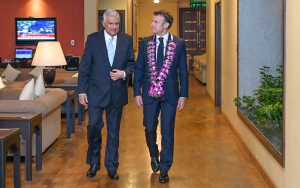French President Emmanuel Macron made a short but historic visit to Sri Lanka on July 28-29, the first by a French president to the Indian Ocean island nation. The timing was auspicious: 2023 marks 75 years of bilateral relations between France and Sri Lanka.
Following Macron’s visit, the Sri Lankan President’s Office noted in a statement, “The main objective was to enhance and elevate the existing relations between Sri Lanka and France, especially considering the 75th anniversary of their diplomatic ties being celebrated this year.” But Macron’s visit to Sri Lanka not only carries symbolic value but also strategic salience.
Macron’s visit to Sri Lanka comes against the backdrop of its economic crisis, the worst the country has seen since its independence. The economic fallout of the COVID-19 pandemic and certain structural weaknesses, along with economic mismanagement by successive governments, have contributed to its current economic hardships. With a total debt of around $7.1 billion owed to bilateral creditors, the country’s debt load increased to catastrophic levels, leading to a catastrophic default last year. Today, Sri Lanka is working to restructure its $83 billion in total domestic and external debt.
Over the span of a decade, the Agence Française de Développement, the primary actor in France’s official development assistance, has committed a total of 626 million euros toward various projects in Sri Lanka, establishing itself as one of the prominent bilateral lending partners of Sri Lanka. France, the island nation’s fourth-largest bilateral creditor, has been exhibiting a more favorable outlook toward debt-restructuring efforts in Sri Lanka. France, along with its Indo-Pacific partners, India and Japan, has initiated a joint debt restructuring negotiation program for Sri Lanka to support the island nation’s debt restructuring process. Japanese Finance Minister Suzuki Shunichi termed the launch of this program as “a historical development.”
But, China, the largest bilateral creditor of Sri Lanka, declined to participate in the program and decided that it would only assist the debt-ridden country bilaterally.
Sri Lanka’s economic turmoil has put it in a delicate situation with its foreign creditors, particularly China, to whom it owes around a fifth of its public external debt. Moreover, due to the slowing domestic economy, Chinese banks are now more driven to recover the debt that they had previously lent to developing nations worldwide. Though China is not the primary cause of the Sri Lankan economic crisis, the delicate domestic situation in the Indian Ocean island nation has brought into question the external lending and investments pattern adopted by Beijing, the largest sovereign creditor in overseas development finance in the world.
China employs a distinct approach to external lending compared to conventional bilateral creditors like Japan and France, characterized by non-stringent finance disbursement protocols and minimal consideration to environmental impact assessments, thereby expediting the process of loan accessibility for the borrowing nations. This model of development finance often carries geopolitical implications and compromised sovereignty for the borrower nations.
Macron, during his recent visit to the Indo-Pacific region, brought up this issue of unsustainable loans and investments, and the potential erosion of the sovereignty of the countries in the region. During his visit to the South Pacific, where the great power competition between China and the United States is looming, Macron attempted to characterize China as threatening the sovereignty of the island nations in the region. He denounced “new imperialism,” hinting toward Beijing’s rising economic clout and the subsequent challenge to the “independence” of the island nations in the Indo-Pacific.
Macron arrived in Sri Lanka after visiting the French Pacific territory of New Caledonia and the South Pacific nations of Vanuatu and Papua New Guinea, where he conveyed his message of France being ready to uphold the sovereignty and independence of island nations susceptible to the negative influence of China in the region.
His visit to Sri Lanka also helped reassure Colombo of Paris’ support for debt restructuring and strengthening bilateral relations. France’s diplomatic support for Sri Lanka, along with its Indo-Pacific partners India and Japan, indicates that the island nation is not isolated despite its economic difficulties. Such assurances and constructive approaches are necessary to gain trust in other creditors for the debt restructuring process in the crisis-ridden Sri Lanka and stabilization of its economy.
Macron’s unprecedented visit to Sri Lanka, the first ever by a French president, helped strengthen his message of re-engagement with the Indo-Pacific region with a renewed focus on issues like sustainable development and security considerations. While his visit to the South Pacific portrayed a complex understanding of the region’s priorities and power dynamics for Paris, his last stop in the Indian Ocean island nation of Sri Lanka demonstrated France’s will to support the island nations across the Indo-Pacific in their developmental and security-related needs along with like-minded partners in the region.

































